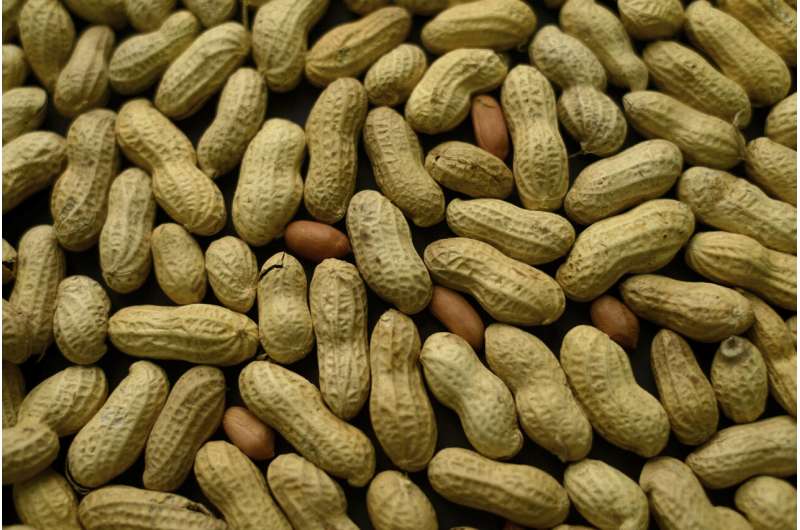This Feb. 20, 2015 file photo shows an arrangement of peanuts in New York. According to a study published in the journal Lancet on Thursday, Jan. 20, 2022, young children might be able to overcome their peanut allergies if treated at an early enough age. Credit: AP Photo/Patrick Sison, File
Young children might be able to overcome their peanut allergies if treated at an early enough age, according to a study published Thursday.
The researchers gave increasing amounts of peanut protein powder to a group of toddlers to build up their tolerance for peanuts. After 2 1/2 years, close to three-quarters could tolerate the equivalent of 16 peanuts without an allergic reaction. Six months after treatment stopped, one-fifth still had the same tolerance.
The approach seemed to work best in the youngest children and those with milder allergies, the researchers reported Thursday in the journal Lancet.
The findings suggest there's "a window of opportunity" early in life when treatment could have a lasting impact, said Dr. Stacie Jones, a study co-author from the University of Arkansas for Medical Services. But she said more research is needed to determine how long the effect might continue.
A treatment for peanut allergies already exists but it is only approved for ages 4 and older, and the protection it provides is for the accidental exposure to small amounts of peanuts. Children are still supposed to avoid eating the nuts, and carry an EpiPen or other medicine for allergic reactions. It also uses peanut powder, but when children stop taking the treatment, the protection stops.
Jones and her colleagues tested a similar approach on younger children to see if their immune systems could be changed if treated at an earlier age. She helped lead a study for the current treatment, Aimmune Therapeutics' Palforzia, and has consulted for the company.
About 2% of children in the U.S. have peanut allergies, which can cause severe reactions and be a source of constant worry for parents. Some children outgrow the allergy, but most have to continue avoiding peanuts for life. To prevent the allergies from developing, health experts in recent years have encouraged parents to feed babies with peanut-containing foods early on.
The new government-funded study involved 146 children in the U.S. ages 1 to 3. They were given daily doses of peanut powder mixed in food or a dummy powder—oat flour. When the treatment ended, 71% of those who got the peanut powder could tolerate the equivalent of 16 peanuts. Six months later, 21% still could. In the dummy powder comparison group, 2% could tolerate 16 peanuts at the end of the treatment and six months later.
Most of the children had a reaction during treatment, mostly mild to moderate. Some in the peanut group required treatment with an EpiPen.
The research "really supports something that we thought for a while in the field," said Dr. Joyce Hsu, an allergy specialist at Brigham and Women's Hospital in Boston who was not involved in the study. "Children's immune systems are generally more malleable when they are younger."
Hsu's clinic offers an allergy treatment with peanut protein for children ages 4 months and older. As with Palforzia, Hsu noted it is intended to protect against accidental ingestion, and that children are still supposed to avoid peanuts. She said there has been a lack of strong data about treating peanut allergies in infants and very young children.
In a commentary published with the study, other allergy experts noted the wide availability of the peanut powder used in the study. They said the treatment is a reasonable option that's ready for real-world implementation, under the guidance of an allergy specialist.
Dr. John Kelso, an allergy specialist at Scripps Clinic in San Diego, said the findings should give doctors more confidence to try the treatment for toddlers, and offer it to parents. But he noted that it's still not clear whether any tolerance would have a limit or how it might change over time.
"There still needs to be some caution about thinking of this as a cure," he said.
More information: Efficacy and safety of oral immunotherapy in children aged 1–3 years with peanut allergy (the Immune Tolerance Network IMPACT trial): a randomised placebo-controlled study, The Lancet (2022). DOI: 10.1016/PIIS0140-6736(21)02390-4 , www.thelancet.com/journals/lan … (21)02390-4/fulltext
Journal information: The Lancet
© 2022 The Associated Press. All rights reserved. This material may not be published, broadcast, rewritten or redistributed without permission.





















